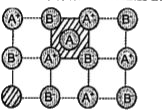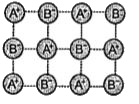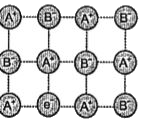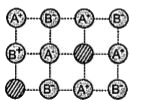which of the following statement are not true ?
(a) Vacancy defect results in a decrease in the density of the substance
(b)interstitial defects results in an increase in the density of the substance
(c)impurity defect has no effect on the density of the substance
(d)Frenkel defect results results in an increase in the density of the substance
Vacancy defect results in a decrease in the density of the substance
interstitial defects results in an increase in the density of the substance
impurity defect has no effect on the density of the substance
Frenkel defect results results I n an increase in the density of the substance
The correct Answer is:C,D
To determine which of the statements regarding defects in solids are not true, we will analyze each statement one by one.
1. Statement (a): Vacancy defect results in a decrease in the density of the substance.
- Analysis: A vacancy defect occurs when an atom or ion is missing from its lattice site in a crystal structure. This absence of particles leads to a decrease in the overall mass of the crystal while the volume remains the same, resulting in a decrease in density.
- Conclusion: This statement is true.
2. Statement (b): Interstitial defects result in an increase in the density of the substance.
- Analysis: An interstitial defect occurs when extra atoms or ions are inserted into the spaces (interstitial sites) between the regular lattice sites. This addition increases the mass of the crystal without significantly changing its volume, leading to an increase in density.
- Conclusion: This statement is true.
3. Statement (c): Impurity defect has no effect on the density of the substance.
- Analysis: Impurity defects occur when foreign atoms are introduced into the crystal lattice. These impurities can have different densities compared to the host material. Depending on the nature of the impurities, they can either increase or decrease the overall density of the substance.
- Conclusion: This statement is not true.
4. Statement (d): Frenkel defect results in an increase in the density of the substance.
- Analysis: A Frenkel defect involves an ion leaving its lattice site and occupying an interstitial site. While there is a movement of ions, the total mass of the crystal remains unchanged because no additional ions are added, and no ions are lost. Thus, the density remains the same.
- Conclusion: This statement is not true.
Final Answer:
The statements that are not true are:
- (c) Impurity defect has no effect on the density of the substance.
- (d) Frenkel defect results in an increase in the density of the substance.
- Analysis: A vacancy defect occurs when an atom or ion is missing from its lattice site in a crystal structure. This absence of particles leads to a decrease in the overall mass of the crystal while the volume remains the same, resulting in a decrease in density.
- Conclusion: This statement is true.
- Analysis: An interstitial defect occurs when extra atoms or ions are inserted into the spaces (interstitial sites) between the regular lattice sites. This addition increases the mass of the crystal without significantly changing its volume, leading to an increase in density.
- Conclusion: This statement is true.
- Analysis: Impurity defects occur when foreign atoms are introduced into the crystal lattice. These impurities can have different densities compared to the host material. Depending on the nature of the impurities, they can either increase or decrease the overall density of the substance.
- Conclusion: This statement is not true.
- Analysis: A Frenkel defect involves an ion leaving its lattice site and occupying an interstitial site. While there is a movement of ions, the total mass of the crystal remains unchanged because no additional ions are added, and no ions are lost. Thus, the density remains the same.
- Conclusion: This statement is not true.
The statements that are not true are:
- (c) Impurity defect has no effect on the density of the substance.
- (d) Frenkel defect results in an increase in the density of the substance.
Topper's Solved these Questions
- SOLID STATEBOOK - NCERT EXEMPLAR ENGLISHCHAPTER - SOLID STATEEXERCISE - short answer type Questions
19 Videos
- SOLID STATEBOOK - NCERT EXEMPLAR ENGLISHCHAPTER - SOLID STATEEXERCISE - matching the columns
1 Videos
- POLYMERBOOK - NCERT EXEMPLAR ENGLISHCHAPTER - POLYMEREXERCISE - Long Answer Type Question
5 Videos
- SOLUTIONS BOOK - NCERT EXEMPLAR ENGLISHCHAPTER - SOLUTIONS EXERCISE - LONG ANSWER TYPE QUESTIONS
8 Videos
Similar Questions
Knowledge Check
The crystal showing Frenkel defect is:
A B
B C
C D
D
Which of the following defects is also known as dislocation defect?
AFrenkel defectBSchottky defectCNon-stoichiometric defectDSimple interstitial defect
Which defect causes decreases in the density of crystal?
View SolutionWhich has Frenkel defect ?
View SolutionFrenkel defect is caused due to
View SolutionWhich of the following defects decrease the density ?
View SolutionWhich of the following has Frenkel defect?
View SolutionWhich point defect lowers the density of a crystal?
View Solution
